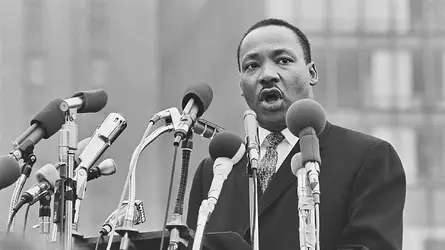
The Rev. Martin Luther King Jr. gives a speech outside the UN on April 15, 1967, in New York City.
Photo: Santi Visalli/Getty Images
The Rev. Martin Luther King Jr.'s family is concerned that President Trump's order to release records about his assassination could revive the FBI's attempts to discredit him — efforts that sought to exploit his indiscretions and undermine his legacy, sources close to his relatives tell Axios.
- The family requested a sneak preview of the records prior to their release. Trump declined, a White House official said, but not out of animus toward the family.
- Last month, Trump ordered the release of all records the U.S. government still holds about King's assassination in 1968, as well as the assassinations of President Kennedy (1963) and Sen. Robert F. Kennedy (196
.
- The FBI has released documents about King's private life previously, but the new disclosure could include more documents detailing alleged embarrassing interactions in hotel rooms, private homes and even King's house,
- "Family members wanted an advanced viewing" of the documents, "and [Trump] said no," the White House official said, explaining that the president believes "these records don't belong to them. These are the public's records."
- The president's abiding interest is disclosure about what the government knew about the assassinations, not salacious details about the leaders' sex lives, the official said, adding that the King family's concerns had been relayed to the White House.
- "Everything will be revealed," Trump said last month after he announced his order to disclose information about the three 1960s assassinations that shaped a turbulent decade in American society and politics.
- In 1969, James Earl Ray, a career criminal, pleaded guilty to shooting King but later recanted his confession, saying he was part of a larger conspiracy.
- Allegations of government complicity have persisted for decades, with civil rights leaders, investigative authors and Ray's attorneys citing the FBI, Memphis police, and Missouri State Penitentiary — from which Ray escaped a year before the killing — as potential conspirators.
- "The assassination of our father is a deeply personal family loss that we have endured over the last 56 years. We hope to be provided the opportunity to review the files as a family prior to its public release," the family said in an Instagram post Jan. 24, the day after Trump's order.
- "There are deep concerns" within the family, said a second source who has corresponded with one of King's two surviving adult children.
- "They know the right wing wants to smear Dr. King, and one way to do it is by putting these smears in the public under the guise of transparency. If there are assassination records, release those. But smears are not assassination records."
- So the King family and Trump share a common antagonist: the FBI.
- Congress formally recognized King's iconic status by approving a federal holiday in his honor more than 15 years after he was killed in Memphis.
- In the following decades, his legacy drew bipartisan admiration. More recently, however, far-right commentators such as Charlie Kirk, a Trump ally, began criticizing King.
- Trump has banned DEI programs in the U.S. government. He signed a proclamation declaring February as Black History Month — but his DEI ban led federal agencies to cancel activities celebrating it.
- "We must mark [King] now ... as the most dangerous Negro of the future in this Nation from the standpoint of communism, the Negro and national security," William Sullivan, then the FBI's director of intelligence, wrote in a memo two days after King delivered his famous "I Have a Dream" speech.
- As attorney general, Robert Kennedy approved Hoover's request in 1963 to wiretap King amid concerns that King was associating with communists.
- That led the FBI to expand its surveillance to include bugging King's home and hotel rooms. FBI agents reported that King was involved in several sexual liaisons, according to "MLK/FBI" and documents in the National Archives.
- In November 1964, the FBI anonymously sent a package to King at his home with a copy of an electronic surveillance tape that included personal information and a note suggesting that he kill himself, documents in the National Archives show.
- A federal judge in 1977 ordered most recordings and reports on King's private life sealed until 2027. Under Trump's order, the documents would be released two years early, by March 9.
- But Pollard said the release also is likely to include tapes that will give scholars insight on conversations King had with Jesse Jackson and other associates on their strategies and views on their civil rights movement.
- "I don't think, personally, it's gonna hurt his reputation," said Pollard, who received a "cease and desist" order from King's family when he was working on his film but later reached an agreement with the family.
- The records regarding Robert Kennedy's assassination are supposed to be released after King's records, sometime after March 9.
Archive
